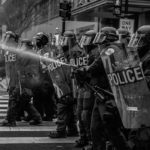Failure to give Miranda Rights can violate your rights.
If a suspect is questioned by law enforcement, the failure to read them their Miranda Rights might result in the suppression of evidence.

Failure to Read Miranda Rights Generally Will Not Result in Dismissal of Charges
Many people believe that if they are arrested and are not “read their rights,” they can escape punishment. This is not true. Failure to read Miranda Rights to a defendant in custody can result in the suppression of any incriminatory responses. A suspect who is not in custody is not entitled to Miranda. What is custody? Custody is determined on a case-by-case basis and generally is determined by examining whether a reasonable person would believe they are free to leave. Federal and state law enforcement agents, including police officers, must notify all criminal suspects in custody of their Fifth Amendment privilege against self-incrimination and their Sixth Amendment right to consult a lawyer.
If the police fail to read a suspect’s Miranda rights, the prosecutor cannot use their answers to questions while under arrest as evidence against the suspect at trial. However, as with nearly all legal rules, there are exceptions.
What are Miranda Rights?
These Miranda rights are familiar to most people who watch T.V. police shows. Upon the arrest of a suspect, they are read:
- You have the right to remain silent.
- If you say anything, what you say can be used against you in a court of law.
- You have the right to consult with a lawyer and have that lawyer present during questioning.
- If you cannot afford a lawyer, one will be appointed for you at public expense.
- If you choose to speak to a police officer, you have the right to stop the interview at any time.

When are Miranda Warnings Required
It does not matter if you are in jail, at the crime scene, on a busy street, or in an open field, when you are being interrogated, if you are in custody (not free to leave or deprived of freedom of movement in a significant way), you must be read your Miranda warnings if they want to question you and use your answers as evidence in court. If you are not in police custody, no Miranda warnings are required, and anything you say can be used in court.
Pre-Arrest Questioning
Understanding your rights during pre-arrest questioning is crucial. Even if you haven’t been formally arrested, law enforcement officials may still conduct questioning. It’s important to note that any statements you make during this time can be admissible in court, even if Miranda warnings have not been provided. This is because Miranda rights typically apply only to custodial interrogations. If you suspect that you might be a subject of interest in a criminal investigation, it’s advisable to exercise caution when approached by police for questioning. Never talk to the police, under any circumstances, without the assistance of an experienced criminal defense lawyer.

Post-Arrest Questioning
Exercising caution when interacting with law enforcement after an arrest is crucial. It is advisable to refrain from discussing your case with the police until you have consulted with a legal representative. The primary objective of police officers in such situations is to gather evidence that could potentially support their case. When they seek to question a suspect, their goal is to elicit a confession or secure statements that could be used against the individual in court proceedings.
It’s important to be aware that even if you assert your innocence during a custodial interrogation, your behavior and responses can be subjectively interpreted. Officers might note signs of nervousness, such as an inability to maintain eye contact or other behaviors they deem suspicious, as potential indicators of guilt. Consulting with an attorney before engaging in any conversation with the police is critical in protecting your legal rights and ensuring that you do not inadvertently compromise your defense.
Consequences of Failing to Provide Miranda Warnings
It’s crucial to understand the implications of Miranda rights in legal proceedings. If you’re subjected to custodial interrogation and the police fail to provide Miranda warnings, your statements may not be admissible in court. This rule is designed to protect your Fifth Amendment right against self-incrimination. Furthermore, if the police discover evidence as a direct result of violating Miranda rights, such evidence could also be considered inadmissible. This principle is known as the ‘Fruit of the Poisonous Tree’ doctrine, an extension of your Fourth Amendment protections.
An experienced, affordable defense attorney can play a pivotal role here. They can file a ‘Motion to Suppress’ to argue that any evidence obtained through this violation should be excluded from the trial. This legal strategy is fundamental to ensuring that your rights are upheld and that the evidence presented in court is obtained lawfully and ethically.

We are Experts in Issues Relating to Miranda Warnings
The attorneys at LEWIS & DICKSTEIN, P.L.L.C. practice exclusively criminal law and are recognized experts in the field. They are constantly educating themselves to keep abreast of the frequent changes in criminal law. If you are being charged with a felony or misdemeanor offense and there are potential constitutional rights violations or possible Miranda warning violations, it is essential that you let a criminal law expert evaluate your situation. Contact us for a free consultation. We will take the time to talk with you, answer your questions, and address your concerns.
Call us today at (248) 263-6800 for a free consultation or complete an online Request for Assistance Form. We will contact you promptly and find a way to help you.












